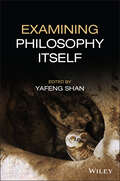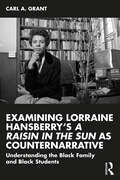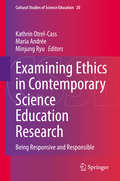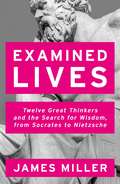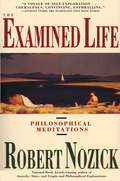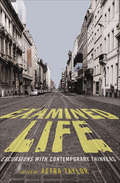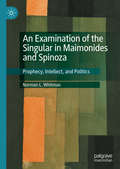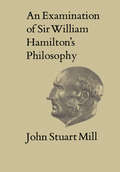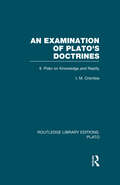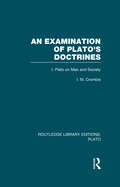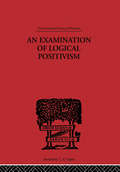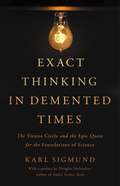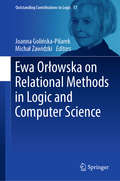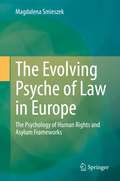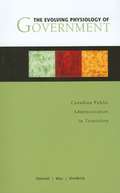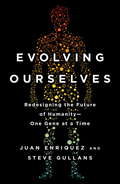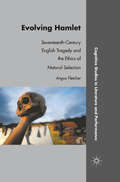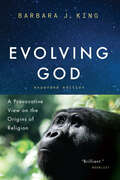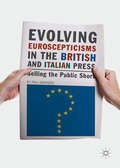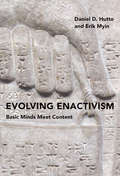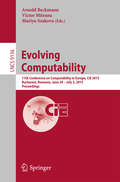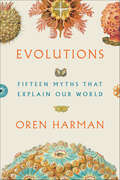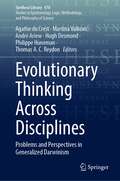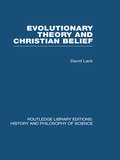- Table View
- List View
Examining Philosophy Itself (Metaphilosophy)
by Yafeng ShanEXAMINING PHILOSOPHY ITSELF One of the most distinctive features of philosophy is self-reflection. Philosophers are not only concerned with metaphysical, epistemological, conceptual, ethical, and aesthetic issues of things around us, they also pay serious attention to the nature, value, methods, and development of philosophy itself. This book examines some of the most important metaphilosophical issues: Is philosophy progressive? Are metaphysical claims meaningful? What is the aim of philosophy? Should analytic metaphysics be replaced by naturalised metaphysics? What is the prospect of a digital approach to philosophy of science? Can poetry play a substantial role in philosophy? Examining Philosophy Itself will be of interest to researchers and advanced students in philosophy.
Examining Lorraine Hansberry’s A Raisin in the Sun as Counternarrative: Understanding the Black Family and Black Students
by Carl A. GrantExamining Lorraine Hansberry’s A Raisin in the Sun as Counternarrative: Understanding the Black Family and Black Students shows how and why Lorraine Hansberry’s play, A Raisin in the Sun, should be used as a teaching tool to help educators develop a more accurate and authentic understanding of the Black Family. The purpose of this book is to help educators develop a greater awareness of Black children and youth’s, humanity, academic potential and learning capacity, and for teachers to develop the consciousness to disavow white supremacy, American exceptionalism, myths, racial innocence, and personal absolution within the education system. This counternarrative responds to the flawed and racist perceptions, stereotypes, and tropes that are perpetuated in schools and society about the African American family and Black students in US schools. It is deliberative and reverberating in addressing anti-Black racism. It argues that, if Education is to be reimagined through a social justice structure, teachers must be educated with works that include Black artists and educators, and teachers must be committed to decolonizing their own minds. Examining Lorraine Hansberry’s A Raisin in the Sun as Counternarrative: Understanding the Black Family and Black Students is important reading for undergraduate and postgraduate courses in Educational Foundations, Curriculum and Instruction, Education Policy, Multicultural Education, Social Justice Education, and Black Studies. It will also be beneficial reading for in-service educators.
Examining Ethics in Contemporary Science Education Research: Being Responsive and Responsible (Cultural Studies of Science Education #20)
by Kathrin Otrel-Cass Maria Andrée Minjung RyuThis book poses questions on how to work ethically in research on science education. Applying research ethics reflectively and responsibly is fundamental for conducting research with people. It seeks to renew the conversation on how and why to engage with ethics in science education research and to adjust and refine research practices. It highlights both the need for methodological reflections in science education research and the particular ethical research challenges of science education. Science education research involves the study of people – often young and vulnerable people – and their practices. Researchers working within humanities and social science research commonly follow guidelines and codes of conducts set by country-specific ethics committees. Such guidelines function as minimal requirement for ethical reflection. This book seeks to engage the community of science education researchers in a conversation on ethics in science education moving beyond the mere compliance with governmental regulations toward a collective reflection. It asks the question of whether the existing guidelines provided for researchers are keeping up with contemporary realities of the visual presence of individuals in digital spaces. It also asks questions on how participatory research methodologies alters the relations between researchers and practitioners. This book is organized into two parts: Part one is entitled Challenging existing norms and practices. It asks questions such as: What are the conditions of knowledge that shape ethical decision making? Where is this kind of knowledge coming from? How is this knowledge structured, and where are the limitations? How can we justify our beliefs concerning our ethical research actions? Part two Epistemological considerations for ethical science education research centres norms and practices of conducting science education research in regard to methods, validity and scope.
Examined Lives: Twelve Great Thinkers and the Search for Wisdom, from Socrates to Nietzsche
by Prof. James MillerWho are we? How should we live? Professor James Miller introduces twelve great philosophers who dedicated their lives to answering these questions. From Plato, who risked his reputation to tutor a tyrant, to Seneca, the philosopher of temperance who accumulated one of the greatest fortunes in Rome, to Kant, who privately wrestled with hypochondria while publicly advocating arch-rationality, each had a unique approach to examining life. Here is a fascinating insight into the ideals that have guided us for centuries, and those who have fought passionately to live up to them.
The Examined Life: Philosophical Meditations
by Robert NozickOne of this century’s most original philosophical thinkers, Nozick brilliantly renews Socrates’s quest to uncover the life that is worth living. In brave and moving meditations on love, creativity, happiness, sexuality, parents and children, the Holocaust, religious faith, politics, and wisdom, The Examined Life brings philosophy back to its preeminent subject, the things that matter most. We join in Nozick’s reflections, weighing our experiences and judgments alongside those of past thinkers, to embark upon our own voyages of understanding and change.
Examined Life: Excursions with Contemporary Thinkers
by Astra TaylorPhilosophy reconnects with daily life in these conversations with eight renowned thinkers—the uncut interviews from the documentary film Examined Life. Astra Taylor&’s documentary film Examined Life took philosophy out of the academy and into the streets, reminding us that great ideas are born through profound engagement with the hustle and bustle of everyday life, not in isolation from it. This companion volume features the complete and uncut interviews with eight influential philosophers, all conducted while on the move through public spaces that resonate with their ideas. Slavoj Žižek ponders the purpose of ecology inside a London garbage dump. Peter Singer&’s thoughts on the ethics of consumption are amplified against the backdrop of Fifth Avenue&’s posh boutiques. Michael Hardt ponders the nature of revolution while surrounded by symbols of wealth and leisure. Judith Butler and a friend stroll through San Francisco&’s Mission District, questioning our culture&’s fixation on individualism. And while driving through Manhattan, Cornel West—perhaps America&’s best-known public intellectual—compares philosophy to jazz and blues, reminding us how intense and invigorating the life of the mind can be. Offering exclusive moments with great thinkers in fields ranging from moral philosophy to cultural theory to gender studies, Examined Life reveals philosophy&’s power to transform the way we see the world around us and to imagine our place within it.
An Examination of the Singular in Maimonides and Spinoza: Prophecy, Intellect, and Politics
by Norman L. WhitmanThis book presents an alternative reading of the respective works of Moses Maimonides and Baruch Spinoza. It argues that both thinkers are primarily concerned with the singular perfection of the complete human being rather than with attaining only rational knowledge. Complete perfection of a human being expresses the unique concord of concrete activities, such as ethics, politics, and psychology, with reason. The necessity of concrete historical activities in generating perfection entails that both thinkers are not primarily concerned with an “escape” to a metaphysical realm of transcendent or universal truths via cognition. Instead, both are focused on developing and cultivating individuals’ concrete desires and activities to the potential benefit of all. This book argues that rather than solely focusing on individual enlightenment, both thinkers are primarily concerned with a political life and the improvement of fellow citizens’ capacities. A key theme throughout the text is that both Maimonides and Spinoza realize that an apolitical life undermines individual and social flourishing.
An Examination of Sir William Hamilton's Philosophy
by Alan Ryan John Robson John Stuart MillAppearing just before his successful parliamentary candidature, the Examination, with its deliberate and explicit onslaught on the intuitionists who were, in Mill's view, allied with anti-progressive political and religious forces, brought his beliefs into the public arena in a new way. Some of those who supported him politically found themselves viciously attacked because they had associated themselves with one who assailed settled religious beliefs. Other religionists who rejected many of Mill's attitudes strong expressed their admiration of the Examination because of its exposure to what they, with him, saw as dangerous theological and moral positions.Alan Ryan's analytical and historial introduction dwells on the most significant philosophical elements in the work, placing them in perspective and showing their relations to other aspects of Mill's thought. The textual introduction, by John M. Robson, examines the treatise in context of Mill's life in the 1860s, outlines its composition, and discusses, among other matters, the importance of the extensive revisions Mill made, mostly in response to critics. These revisions appear in full in the textual apparatus. Also provided are a bibliographical index, which gives a guide to the literature on the subject, and a collation of Mill's quotations, an analytical index, and appendices giving the reading of manuscript fragments and listing textual emendations.
An Examination of Plato's Doctrines Vol 2: Volume 2 Plato on Knowledge and Reality (Routledge Library Editions: Plato)
by I M CrombieIan Crombie’s impressive volumes provide a comprehensive interpretation of Plato’s doctrines. Volume 2 deals with more technical philosophical topics, including the theory of knowledge, philosophy of nature, and the methodology of science and philosophy. Each volume is self-contained.
An Examination of Plato's Doctrines: Volume 1 Plato on Man and Society (Routledge Library Editions: Plato)
by I M CrombieIan Crombie’s impressive volumes provide a comprehensive interpretation of Plato’s doctrines. Volume 1 contains topics of more general interest and is mainly concerned with what Plato has to say in the fields of moral philosophy, political philosophy, the philosophy of mind and the philosophy of religion.
An Examination of Logical Positivism (International Library of Philosophy)
by Julius Rudolph WeinbergFirst published in 2000. Routledge is an imprint of Taylor & Francis, an informa company.
Exact Thinking in Demented Times: The Vienna Circle and the Epic Quest for the Foundations of Science
by Douglas Hofstadter Karl SigmundA dazzling group biography of the early twentieth-century thinkers who transformed the way the world thought about math and scienceInspired by Albert Einstein's theory of relativity and Bertrand Russell and David Hilbert's pursuit of the fundamental rules of mathematics, some of the most brilliant minds of the generation came together in post-World War I Vienna to present the latest theories in mathematics, science, and philosophy and to build a strong foundation for scientific investigation. Composed of such luminaries as Kurt Gödel and Rudolf Carnap, and stimulated by the works of Ludwig Wittgenstein and Karl Popper, the Vienna Circle left an indelible mark on science.Exact Thinking in Demented Times tells the often outrageous, sometimes tragic, and never boring stories of the men who transformed scientific thought. A revealing work of history, this landmark book pays tribute to those who dared to reinvent knowledge from the ground up.
Ewa Orłowska on Relational Methods in Logic and Computer Science (Outstanding Contributions to Logic #17)
by Joanna Golińska-Pilarek Michał ZawidzkiThis book is a tribute to Professor Ewa Orłowska, a Polish logician who was celebrating the 60th year of her scientific career in 2017. It offers a collection of contributed papers by different authors and covers the most important areas of her research. Prof. Orłowska made significant contributions to many fields of logic, such as proof theory, algebraic methods in logic and knowledge representation, and her work has been published in 3 monographs and over 100 articles in internationally acclaimed journals and conference proceedings. The book also includes Prof. Orłowska’s autobiography, bibliography and a trialogue between her and the editors of the volume, as well as contributors' biographical notes, and is suitable for scholars and students of logic who are interested in understanding more about Prof. Orłowska’s work.
The Evolving Psyche of Law in Europe: The Psychology of Human Rights and Asylum Frameworks
by Magdalena SmieszekThe book applies an interdisciplinary analytical framework, based on social psychology theories of inclusion and exclusion, to a discussion of legal discourse and the development of legal frameworks in Europe concerning migrants, asylum seekers, refugees, and European citizens. It adopts a psycho-historical perspective to discuss the evolution of international and European law with regard to the rights of citizens and asylum-seeking non-citizens, from the law’s inception following the Second World War up to present-day laws and policies. The book reveals the embracing of a European identity based on human rights as the common feature in European treaties and institutions, one that is focused on European citizens and has inclusionary objectives. However, a cognitive dissonance can also be found, as this common identity-making runs counter to national proclivities, as well as securitized, threat-perception-oriented perspectives that can produce exclusionary manifestations concerning persons seeking asylum. In particular, a view of inclusion and exclusion via legal categorizations of status, as well as distributions of social and economic rights, draws attention to the links between social psychology and international law. What emerges in the analysis: a process of creating value is present both at its psychological roots and the expressions of value in the law. Fundamentally speaking, the emergence of laws and policies that center on human beings and human dignity, when understood from a psychological and emotion-based perspective, has the potential to transcend the dissonances identified.
The Evolving Physiology of Government: Canadian Public Administration in Transition (Governance Series)
by O. P. Dwivedi Tim A. Mau Byron M. SheldrickCanadian public administration has provided a rich ground for examining the changing nature of the state. Currents of political change have rippled through the administration of the public sector, often producing significant alterations in our understanding of how best to organize and administer public services. This volume brings together some of the leading Canadian and international scholars of public administration to reflect on these changes and their significance. Providing a historical perspective on public administration in Canada, the volume examines the shift from a traditional model of administration to newer forms such as new public management and governance, and explores current debates and the place of Canadian public administration within a broader comparative perspective.
Evolving Ourselves
by Juan Enriquez Steve Gullans"We are the primary drivers of change. We will directly and indirectly determine what lives, what dies, where, and when. We are in a different phase of evolution; the future of life is now in our hands."Why are rates of conditions like autism, asthma, obesity, and allergies exploding at an unprecedented pace? Why are humans living longer, getting smarter, and having far fewer kids? How might your lifestyle affect your unborn children and grandchildren? If Darwin were alive today, how would he explain this new world? Could our progeny eventually become a different species--or several?In Evolving Ourselves, futurist Juan Enriquez and scientist Steve Gullans conduct a sweeping tour of how humans are changing the course of evolution--sometimes intentionally, sometimes not. For example:Globally, rates of obesity in humans nearly doubled between 1980 and 2014. What's more, there's evidence that other species, from pasture-fed horses to lab animals to house cats, are also getting fatter.As reported by U.S. government agencies, the rate of autism rose by 131 percent from 2001 to 2010, an increase that cannot be attributed simply to increases in diagnosis rates.Three hundred years ago, almost no one with a serious nut allergy lived long enough to reproduce. Today, despite an environment in which food allergies have increased by 50 percent in just over a decade, 17 million Americans who suffer from food allergies survive, thrive, and pass their genes and behaviors on to the next generation.In the pre-Twinkie era, early humans had quite healthy mouths. As we began cooking, bathing, and using antibiotics, the bacteria in our bodies changed dramatically and became far less diverse. Today the consequences are evident not only in our teeth but throughout our bodies and minds.Though these harbingers of change are deeply unsettling, the authors argue that we are also in an epoch of tremendous opportunity. New advances in biotechnology help us mitigate the cruel forces of natural selection, from saving prematurely born babies to gene therapies for sickle cell anemia and other conditions. As technology enables us to take control of our genes, we will be able to alter our own species and many others--a good thing, given that our eventual survival will require space travel and colonization, enabled by a fundamental redesign of our bodies. Future humans could become great caretakers of the planet, as well as a more diverse, more resilient, gentler, and more intelligent species--but only if we make the right choices now. Intelligent, provocative, and optimistic, Evolving Ourselves is the ultimate guide to the next phase of life on Earth.
Evolving Ourselves: How Unnatural Selection and Nonrandom Mutation are Changing Life on Earth
by Steve Gullans Juan Enriquez"We are the primary drivers of change. We will directly and indirectly determine what lives, what dies, where, and when. We are in a different phase of evolution; the future of life is now in our hands."Why are rates of conditions like autism, asthma, obesity, and allergies exploding at an unprecedented pace? Why are humans living longer, getting smarter, and having far fewer kids? How might your lifestyle affect your unborn children and grandchildren? How will gene-editing technologies like CRISPR steer the course of human evolution? If Darwin were alive today, how would he explain this new world? Could our progeny eventually become a different species--or several?In Evolving Ourselves, futurist Juan Enriquez and scientist Steve Gullans conduct a sweeping tour of how humans are changing the course of evolution--sometimes intentionally, sometimes not. For example: * Globally, rates of obesity in humans nearly doubled between 1980 and 2014. What's more, there's evidence that other species, from pasture-fed horses to lab animals to house cats, are also getting fatter. * As reported by U.S. government agencies, the rate of autism rose by 131 percent from 2001 to 2010, an increase that cannot be attributed simply to increases in diagnosis rates. * Three hundred years ago, almost no one with a serious nut allergy lived long enough to reproduce. Today, despite an environment in which food allergies have increased by 50 percent in just over a decade, 17 million Americans who suffer from food allergies survive, thrive, and pass their genes and behaviors on to the next generation. * In the pre-Twinkie era, early humans had quite healthy mouths. As we began cooking, bathing, and using antibiotics, the bacteria in our bodies changed dramatically and became far less diverse. Today the consequences are evident not only in our teeth but throughout our bodies and minds. Though these harbingers of change are deeply unsettling, the authors argue that we are also in an epoch of tremendous opportunity. New advances in biotechnology help us mitigate the cruel forces of natural selection, from saving prematurely born babies to gene therapies for sickle cell anemia and other conditions. As technology like CRISPR enables us to take control of our genes, we will be able to alter our own species and many others--a good thing, given that our eventual survival will require space travel and colonization, enabled by a fundamental redesign of our bodies.Future humans could become great caretakers of the planet, as well as a more diverse, more resilient, gentler, and more intelligent species--but only if we make the right choices now.Intelligent, provocative, and optimistic, Evolving Ourselves is the ultimate guide to the next phase of life on Earth.From the Hardcover edition.
Evolving Hamlet
by Angus FletcherUsing Hamlet and a number of other popular and influential seventeenth-century tragedies as case-studies, this book shows how aesthetic experience can help organize the biological functions of our brains into adaptive social networks.
Evolving God: A Provocative View on the Origins of Religion, Expanded Edition
by Barbara J. KingReligion has been a central part of human experience since at least the dawn of recorded history. The gods change, as do the rituals, but the underlying desire remains—a desire to belong to something larger, greater, most lasting than our mortal, finite selves. But where did that desire come from? Can we explain its emergence through evolution? Yes, says biological anthropologist Barbara J. King—and doing so not only helps us to understand the religious imagination, but also reveals fascinating links to the lives and minds of our primate cousins. Evolving God draws on King’s own fieldwork among primates in Africa and paleoanthropology of our extinct ancestors to offer a new way of thinking about the origins of religion, one that situates it in a deep need for emotional connection with others, a need we share with apes and monkeys. Though her thesis is provocative, and she’s not above thoughtful speculation, King’s argument is strongly rooted in close observation and analysis. She traces an evolutionary path that connects us to other primates, who, like us, display empathy, make meanings through interaction, create social rules, and display imagination—the basic building blocks of the religious imagination. With fresh insights, she responds to recent suggestions that chimpanzees are spiritual—or even religious—beings, and that our ancient humanlike cousins carefully disposed of their dead well before the time of Neandertals. King writes with a scientist’s appreciation for evidence and argument, leavened with a deep empathy and admiration for the powerful desire to belong, a desire that not only brings us together with other humans, but with our closest animal relations as well.
Evolving Euroscepticisms in the British and Italian Press
by Paul RowinskiThis book argues that the discursive construction of the EU in national newspapers is pivotal in creating an environment of Euroscepticism. The volume challenges the persuasive, manipulative and prejudicial language that is sometimes peddled in the influential UK Murdoch and Italian Berlusconi press, using the main focus points of the key Eurosceptic triggers of the € the subsequent national economic crises; and immigration, investigated through major events covered over two decades, including the UK's recent Brexit vote and Italy's constitutional crisis. Rowinski looks at the latest chapter of Euroscepticism: the increasingly key protagonists of the UK Independence Party and Italy's Five Star Movement, who want to take Britain out of the EU and Italy out of the euro. This book offers a rigorous academic analysis presented in an accessible style to experts and laypersons alike, exploring concrete articulations of Euroscepticism in the press.
Evolving Enactivism: Basic Minds Meet Content (The\mit Press Ser.)
by Daniel D. Hutto Erik MyinAn extended argument that cognitive phenomena—perceiving, imagining, remembering—can be best explained in terms of an interface between contentless and content-involving forms of cognition.Evolving Enactivism argues that cognitive phenomena—perceiving, imagining, remembering—can be best explained in terms of an interface between contentless and content-involving forms of cognition. Building on their earlier book Radicalizing Enactivism, which proposes that there can be forms of cognition without content, Daniel Hutto and Erik Myin demonstrate the unique explanatory advantages of recognizing that only some forms of cognition have content while others—the most elementary ones—do not. They offer an account of the mind in duplex terms, proposing a complex vision of mentality in which these basic contentless forms of cognition interact with content-involving ones. Hutto and Myin argue that the most basic forms of cognition do not, contrary to a currently popular account of cognition, involve picking up and processing information that is then used, reused, stored, and represented in the brain. Rather, basic cognition is contentless—fundamentally interactive, dynamic, and relational. In advancing the case for a radically enactive account of cognition, Hutto and Myin propose crucial adjustments to our concept of cognition and offer theoretical support for their revolutionary rethinking, emphasizing its capacity to explain basic minds in naturalistic terms. They demonstrate the explanatory power of the duplex vision of cognition, showing how it offers powerful means for understanding quintessential cognitive phenomena without introducing scientifically intractable mysteries into the mix.
Evolving Computability
by Arnold Beckmann Victor Mitrana Mariya SoskovaThis book constitutes the refereed proceedings of the 11th Conference on Computability in Europe, CiE 2015, held in Bucharest, Romania, in June/July 2015. The 26 revised papers presented were carefully reviewed and selected from 64 submissions and included together with 10 invited papers in this proceedings. The conference CiE 2015 has six special sessions: two sessions, Representing Streams and Reverse Mathematics, were introduced for the first time in the conference series. In addition to this, new developments in areas frequently covered in the CiE conference series were addressed in the further special sessions on Automata, Logic and Infinite Games; Bio-inspired Computation; Classical Computability Theory; as well as History and Philosophy of Computing.
Evolutions: Fifteen Myths That Explain Our World
by Oren HarmanA brilliant lyrical exploration of how modern science illuminates what it means to be human, from the award-winning author of The Price of AltruismWe no longer think, like the ancient Chinese did, that the world was hatched from an egg, or, like the Maori, that it came from the tearing-apart of a love embrace. The Greeks told of a tempestuous Hera and a cunning Zeus, but we now use genes and natural selection to explain fear and desire, and physics to demystify the workings of the universe.Science is an astounding achievement, but are we really any wiser than the ancients? Has science revealed the secrets of fate and immortality? Has it provided protection from jealousy or love? There are those who believe that science has replaced faith, but must it also be a death knell for mythology?Evolutions brings to life the latest scientific thinking on the birth of the universe and the solar system, the journey from a single cell all the way to our human minds. Reawakening our sense of wonder and terror at the world around us and within us, Oren Harman uses modern science to create new and original mythologies. Here are the earth and the moon presenting a cosmological view of motherhood, a panicking mitochondrion introducing sex and death to the world, the loneliness of consciousness emerging from the memory of an octopus, and the birth of language in evolution summoning humankind’s struggle with truth. Science may not solve our existential puzzles, but like the age-old legends, its magical discoveries can help us continue the never-ending search.
Evolutionary Thinking Across Disciplines: Problems and Perspectives in Generalized Darwinism (Synthese Library #478)
by Agathe Du Crest Martina Valković André Ariew Hugh Desmond Philippe Huneman Thomas A. C. ReydonThis volume aims to clarify the epistemic potential of applying evolutionary thinking outside biology, and provides a survey of the current state of the art in research on relevant topics in the life sciences, the philosophy of science, and the various areas of evolutionary research outside the life sciences. By bringing together chapters by evolutionary biologists, systematic biologists, philosophers of biology, philosophers of social science, complex systems modelers, psychologists, anthropologists, economists, linguists, historians, and educators, the volume examines evolutionary thinking within and outside the life sciences from a multidisciplinary perspective. While the chapters written by biologists and philosophers of science address theoretical aspects of the guiding questions and aims of the volume, the chapters written by researchers from the other areas approach them from the perspective of applying evolutionary thinking to non-biological phenomena. Taken together, the chapters in this volume do not only show how evolutionary thinking can be fruitfully applied in various areas of investigation, but also highlight numerous open problems, unanswered questions, and issues on which more clarity is needed. As such, the volume can serve as a starting point for future research on the application of evolutionary thinking across disciplines.
Evolutionary Theory and Christian Belief: The Unresolved Conflict (Routledge Library Editions: History & Philosophy of Science)
by David LackOriginally published in 1957. This book is concerned with the conflict between "Darwinism" as the Victorians called it, and Christianity, a conflict here re-stated in modern terms because it so vitally affects our understanding of human nature and human values today. The opening chapter describes the historical background. There is a short account of evolution and the argument over Genesis. The importance of natural selection is stressed, and rival theories as to the means of animal evolution are criticised. Discussions follow on whether the course of evolution has been random or determined, on the argument from design, death in nature, the biologist’s methods and the difficulties in evolutionary ethics.
